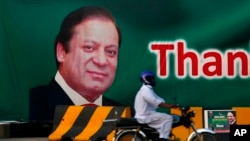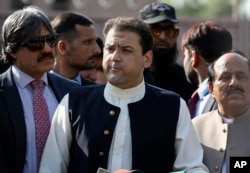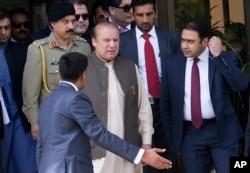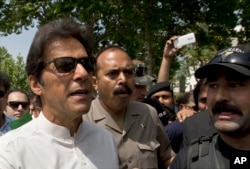A panel appointed by Pakistan's Supreme Court to look into the financial wealth and overseas assets of Prime Minister Nawaz Sharif and his children has recommended that a corruption case be brought against the family.
The six-member Joint Investigation Team, or JIT, Monday presented the court with a detailed report which said, “There exists significant gap/disparity amongst the known and declared sources of income and wealth accumulated” by Sharif, his two sons, Hussain Nawaz and Hassan Nawaz, and daughter, Maryam Nawaz.
The JIT, which included experts from civilian and military intelligence agencies, summoned and questioned Sharif and his children about their family assets and contacted governments abroad before finalizing the report.
“Failure on the part of all respondents to produce the requisite information confirming “known sources of income” is prima facie tantamount not being able to justify assets and the means of income,” the JIT concluded in its findings, which followed the two-month investigation.
Although it will be for the Supreme Court to take further legal action based on the findings, legal experts see the JIT report as a major political blow to Sharif, who has consistently denied charges of wrongdoing. The findings prompted calls from political opponents and media commentators for the prime minister to immediately resign.
“He has been declared a criminal of this country so what morality does he have to sit in the prime minister's seat anymore,” Imran Khan, leader of the country’s main opposition Pakistan Tehreek-e-Insaf party, told reporters shortly after the JIT report was released.
Khan’s party has been leading the legal battles against Prime Minister Sharif. Khan alleges that Sharif received kickbacks and commissions while he was prime minister of Pakistan twice in the 1990's and siphoned off the money to offshore accounts.
Several federal ministers at a hurriedly arranged news conference, however, condemned the report as a “bundle of lies and contradictions.” They vowed to challenge it in the Supreme Court.
The probe against Sharif and his family dates back to April 2016, when the International Consortium of Investigative Journalists published a Pulitzer Prize-winning investigation of a global financial industry that enabled politicians, business people, criminals and others around the world to hide their ill-gotten gains or provide tax havens through offshore companies.
The leaked financial documents, known as the Panama Papers, listed Sharif’s two sons and daughter as holders of offshore accounts.







